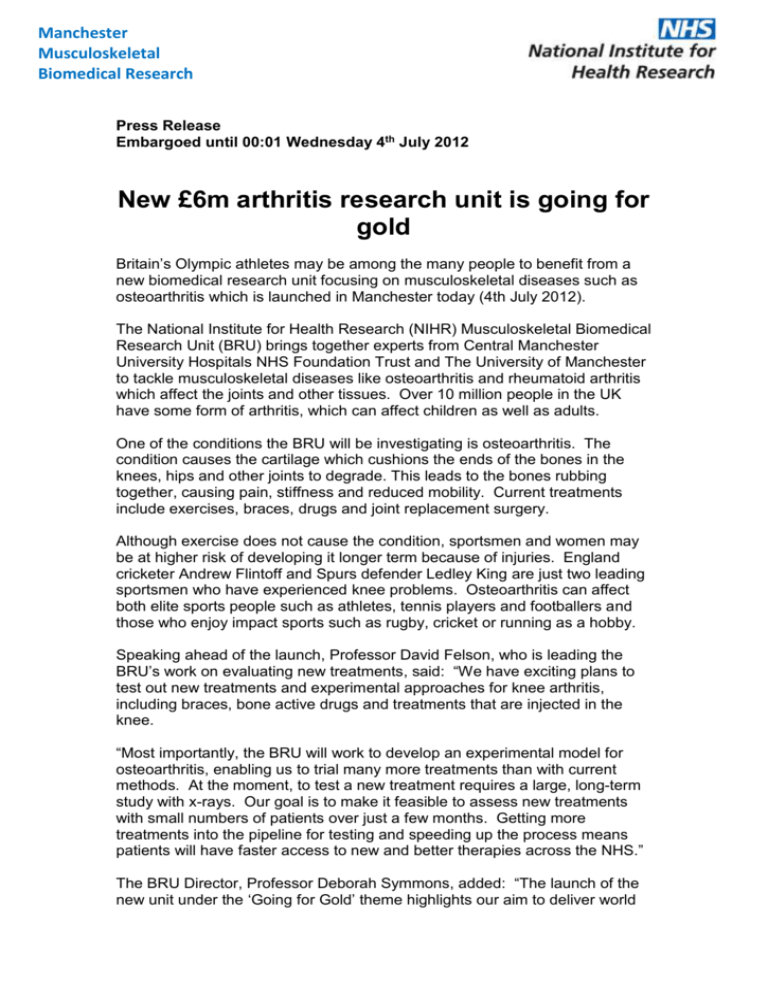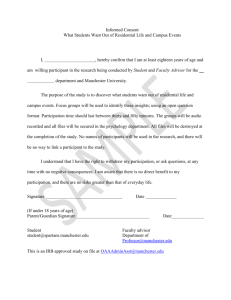Draft press release on BRU launch
advertisement

Manchester Musculoskeletal Biomedical Research Unit Press Release Embargoed until 00:01 Wednesday 4th July 2012 New £6m arthritis research unit is going for gold Britain’s Olympic athletes may be among the many people to benefit from a new biomedical research unit focusing on musculoskeletal diseases such as osteoarthritis which is launched in Manchester today (4th July 2012). The National Institute for Health Research (NIHR) Musculoskeletal Biomedical Research Unit (BRU) brings together experts from Central Manchester University Hospitals NHS Foundation Trust and The University of Manchester to tackle musculoskeletal diseases like osteoarthritis and rheumatoid arthritis which affect the joints and other tissues. Over 10 million people in the UK have some form of arthritis, which can affect children as well as adults. One of the conditions the BRU will be investigating is osteoarthritis. The condition causes the cartilage which cushions the ends of the bones in the knees, hips and other joints to degrade. This leads to the bones rubbing together, causing pain, stiffness and reduced mobility. Current treatments include exercises, braces, drugs and joint replacement surgery. Although exercise does not cause the condition, sportsmen and women may be at higher risk of developing it longer term because of injuries. England cricketer Andrew Flintoff and Spurs defender Ledley King are just two leading sportsmen who have experienced knee problems. Osteoarthritis can affect both elite sports people such as athletes, tennis players and footballers and those who enjoy impact sports such as rugby, cricket or running as a hobby. Speaking ahead of the launch, Professor David Felson, who is leading the BRU’s work on evaluating new treatments, said: “We have exciting plans to test out new treatments and experimental approaches for knee arthritis, including braces, bone active drugs and treatments that are injected in the knee. “Most importantly, the BRU will work to develop an experimental model for osteoarthritis, enabling us to trial many more treatments than with current methods. At the moment, to test a new treatment requires a large, long-term study with x-rays. Our goal is to make it feasible to assess new treatments with small numbers of patients over just a few months. Getting more treatments into the pipeline for testing and speeding up the process means patients will have faster access to new and better therapies across the NHS.” The BRU Director, Professor Deborah Symmons, added: “The launch of the new unit under the ‘Going for Gold’ theme highlights our aim to deliver world Manchester Musculoskeletal Biomedical Research Unit class research to help people living with musculoskeletal disorders. Our ultimate goal is to deliver the best possible treatment for patients with arthritis, whatever the cause may be.” The BRU has received funding from the NIHR (£4.9m) and the Department of Health (£1.5m). Health Secretary Andrew Lansley said: "We know that conditions like arthritis and rheumatism can have a devastating effect on peoples' lives, so it is essential that we develop new treatments to help NHS patients and their families. “Researchers working at this research unit will develop innovative new ways of treating these conditions which will have a real, lasting and positive impact on patient care. “The Government is committed to supporting such work and bringing breakthroughs from every area to the front line of the NHS." Professor Dame Sally C. Davies, Chief Medical Officer and Chief Scientific Adviser at the Department of Health said: “This NIHR Biomedical Research Unit in Manchester was selected on the basis of the world-class quality of its translational clinical research and its potential to pull findings from basic science into real benefits for patients and the NHS. The research into musculoskeletal diseases that will be carried out in this new Unit will improve the care and services for NHS patients, and improve people's lives. The NIHR funding for this Unit is part of the record £800 million investment provided by the Government for translational research between 2012 and 2017." Manchester has played a leading role in studying and treating musculoskeletal disorders since 1945, when the first research centre for the study of chronic rheumatism was set up at Manchester Royal Infirmary. Ends For further information please contact: Lucy Prosser NIHR Manchester Musculoskeletal Biomedical Research Unit 0161 701 0260 / 0782 514 2219 Lucy.prosser@cmft.nhs.uk The NIHR Manchester Musculoskeletal Biomedical Research Unit was created by the National Institute for Health Research in 2012 to move scientific breakthroughs in the laboratory, through clinical assessment into improved outcomes for adults and children with musculoskeletal disorders such as arthritis. As a partnership between Central Manchester University Hospitals NHS Foundation Trust and The University of Manchester, the Biomedical Research Unit is designated as a specialist centre of excellence in musculoskeletal diseases. www.manchestermskbru.org Manchester Musculoskeletal Biomedical Research Unit The National Institute for Health Research is funded by the Department of Health to improve the health and wealth of the nation through research. Since its establishment in April 2006, the NIHR has transformed research in the NHS. It has increased the volume of applied health research for the benefit of patients and the public, driven faster translation of basic science discoveries into tangible benefits for patients and the economy, and developed and supported the people who conduct and contribute to applied health research. The NIHR plays a key role in the Government’s strategy for economic growth, attracting investment by the life-sciences industries through its world-class infrastructure for health research. Together, the NIHR people, programmes, centres of excellence and systems represent the most integrated health research system in the world. For further information, visit the NIHR website (www.nihr.ac.uk). The University of Manchester, a member of the Russell Group, is one of the largest and most popular universities in the UK. It has 20 academic schools and hundreds of specialist research groups undertaking pioneering multidisciplinary teaching and research of worldwide significance. According to the results of the 2008 Research Assessment Exercise, The University of Manchester is one of the country’s major research institutions, rated third in the UK in terms of ‘research power’. The University had an annual income of £809 million in 2010/11. (www.manchester.ac.uk) Central Manchester University Hospitals NHS Foundation Trust is a leading provider of specialist healthcare services in Manchester, treating more than a million patients every year. Its eight specialist hospitals (Manchester Royal Infirmary, Saint Mary’s Hospital, Royal Manchester Children’s Hospital, Manchester Royal Eye Hospital, University Dental Hospital of Manchester and Trafford Hospitals) are home to hundreds of world class clinicians and academic staff committed to finding patients the best care and treatments. (www.cmft.nhs.uk)







